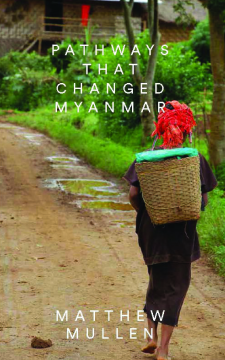
Additional Information
Book Details
Abstract
In the midst of the political upheavals that engulfed Myanmar from 2010 to 2011, international attention was fixed upon the military regime and its dissident opponents. But away from the cameras, a very different set of struggles were unfolding across the country. These struggles were manifested not as violent clashes, but as everyday interactions involving taxi drivers, community organizers, farmers, heads of domestic NGOs, and many more.
A product of five years' research, during which the author conducted over five hundred ethnographic interviews across the country, Pathways that Changed Myanmar provides a voice for those ordinary Burmese whose trials and aspirations went unheard and unnoticed during this pivotal moment in the nation's history.
Matthew Mullen lectures at the Institute of Human Rights and Peace Studies, Mahidol University, Thailand. He has written widely on the politics of Myanmar, as well as on oppression and resistance, transitional justice, structural and cultural violence, and business and human rights.
'Places a powerful magnifying glass over what precisely is happening in Myanmar...remarkable insights on almost every page.'
The Nation
‘This book captures a story that needed to be told, and extracts lessons for both Myanmar and the world. As Mullen states, struggling against authoritarianism is “never as simple as rallying around those fighting the good fight.”'
Aung Naing Oo, Burmese peace and democracy advocate
‘This book gives voice to all those in Myanmar who continue to fight for change. The change we see in Myanmar today did not fall from the sky. It was made by small steps won each day over years, even decades. This book documents how these steps were taken.’
Nwet Kay Khine, journalist and former editor of The Voice (Myanmar)
‘This book provides important insights into how internal politics, foreign powers, and cultural peculiarities can shape transition in the most unexpected ways.'
Yaraslau Kryvoi, University of West London
‘In an era when many are eager to declare themselves “Burma experts”, Matthew Mullen stands out for his humility and thoughtfulness. He has created a rarity: an academic book that’s fun to read, painstakingly detailed, and which provides model of how to do research in a shifting landscape.’
Rosalie Metro, University of Missouri
'Mullen’s book sheds light on the reality of everyday life under military rule, and the stories he reveals challenge the narratives we have become accustomed to. During this often difficult period of top-down change in Myanmar, the book is a refreshing reminder that change comes from multiple sources and carries various meanings for each of us.'
Tea Circle, University of Oxford
'These are stories from the people themselves. In this sense, the book is an incredibly valuable source of descriptive material from the field.'
Newbooks.Asia
Table of Contents
| Section Title | Page | Action | Price |
|---|---|---|---|
| Front cover | Front cover | ||
| About the author | i | ||
| Title page | iii | ||
| Copyright | iv | ||
| Contents | v | ||
| Acknowledgements | vii | ||
| One. Introduction | 1 | ||
| Contrasting pathways to change | 5 | ||
| The research | 12 | ||
| The road to NLD-led Myanmar | 20 | ||
| Two. The clash that galvanized a global movement | 26 | ||
| 8/8/88 | 29 | ||
| The Saffron Revolution | 32 | ||
| Armed resistance | 34 | ||
| The pathway: contentious politics | 40 | ||
| Global framing around contentious politics | 43 | ||
| Three. The Third Force | 48 | ||
| Profiling the Third Force | 49 | ||
| The pathway: reconstructive politics | 54 | ||
| Constructing reconstructive politics | 65 | ||
| Engaging a malleable system | 66 | ||
| The dissolution of the Third Force | 73 | ||
| Four. Everyday resistance | 75 | ||
| Weapons of the weak in military-ruled Myanmar | 76 | ||
| Successful coping | 83 | ||
| Flexed political muscles at the extremities | 90 | ||
| The exclusion of everyday resistance | 97 | ||
| Valuing local navigation | 104 | ||
| Five. From bullets to bribery | 111 | ||
| Published and palpable tensions | 113 | ||
| “Real” change | 119 | ||
| Whose concerns? | 126 | ||
| Compromise | 132 | ||
| Sacrifice | 138 | ||
| Moral compasses | 142 | ||
| Recognition | 147 | ||
| Six. Sanctions: a cure and a disease | 153 | ||
| Sanctions as a cure | 156 | ||
| Sanctions as a disease | 162 | ||
| What sanctions are not | 170 | ||
| Avoiding aristocracy | 178 | ||
| Seven. Nay Win Maung’s funeral | 181 | ||
| Nay Win Maung: in his own words | 182 | ||
| A reconciliatory funeral | 187 | ||
| Nay Win Maung’s legacy | 189 | ||
| Eight. From human rights rhetoric to 969 | 193 | ||
| 969 | 196 | ||
| On the receiving end | 199 | ||
| From righteous to predatory | 201 | ||
| Nine. Transitioning to an NLD-led Myanmar | 206 | ||
| A challenging road to the 2015 elections | 207 | ||
| Contracting the transition through Naypyidaw | 215 | ||
| No silver bullet in NLD-led Myanmar | 228 | ||
| Notes | 233 | ||
| References | 238 | ||
| Index | 252 | ||
| Back cover | Back cover |
